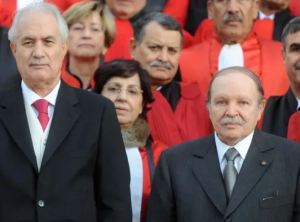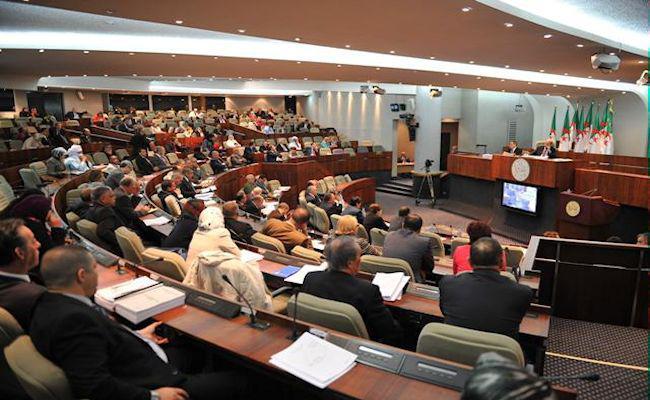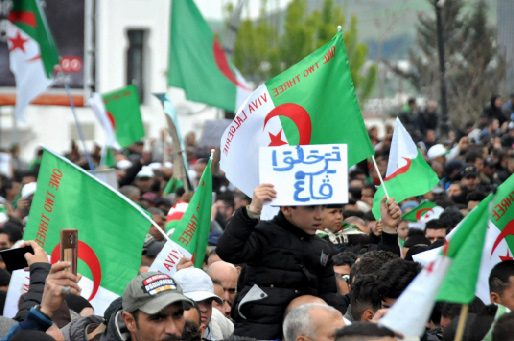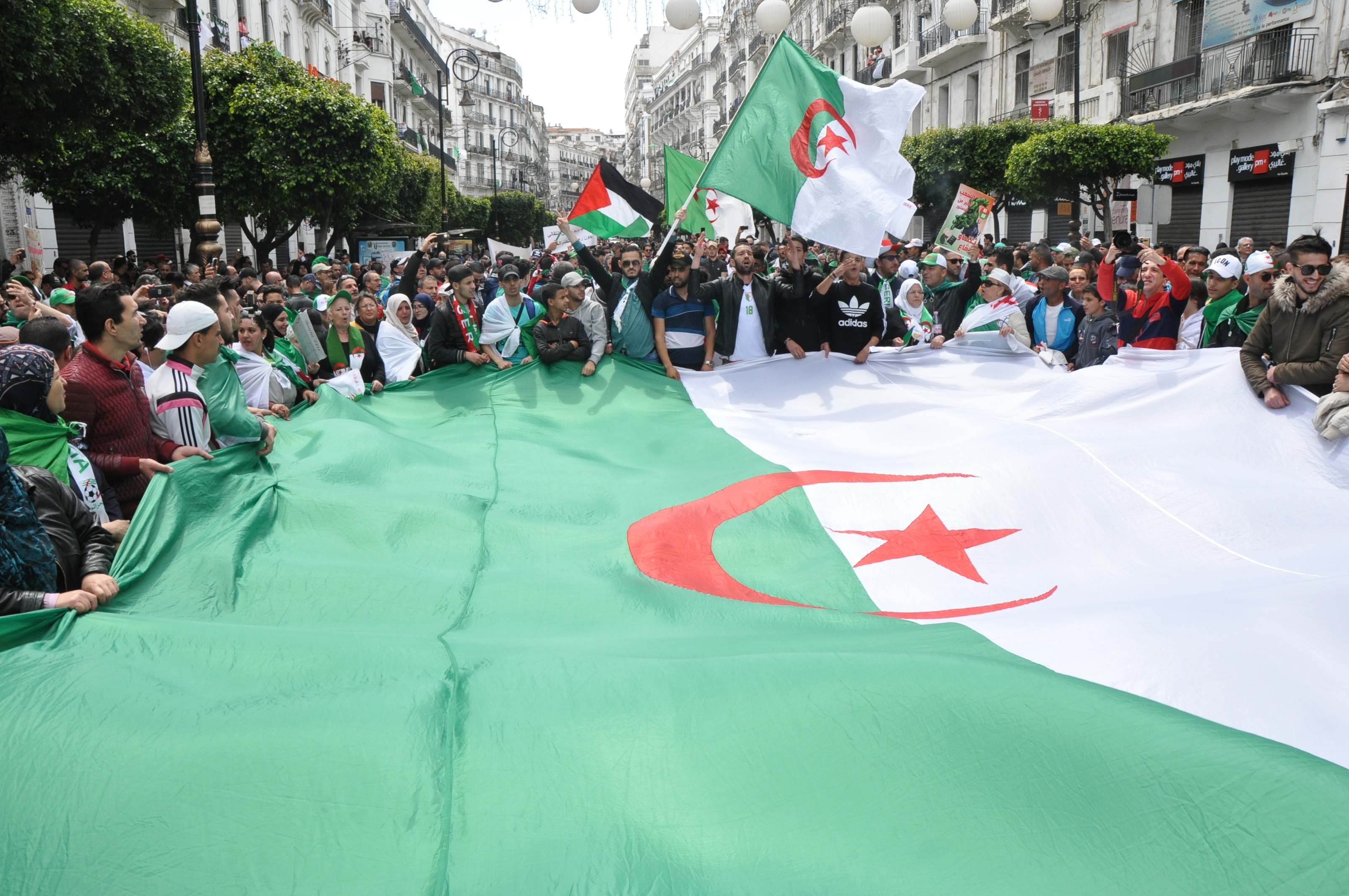www.aljazeerah.info
Opinion Editorials, April 2019
Archives
Mission & Name
Conflict Terminology
Editorials
Gaza Holocaust
Gulf War
Isdood
Islam
News
News Photos
Opinion Editorials
US Foreign Policy (Dr. El-Najjar's Articles)
www.aljazeerah.info
Algeria: The men likely tasked to drive the post-Bouteflika transition and why people don't trust them By Arezki Daoud North Africa.com, April 8, 2019
|
|
 |
 |
|
Tayeb Belaiz (left) heads the Constitutional Council |
Algerian Parliament met to acknowledge the vacancy of the
presidency after the resignation of the ailing president, April 4, 2019 dz breaking |
***
There have been loud voices calling for a clean slate in the Algerian system of governance. Donald Trump used to call it “cleaning the swamp.” But by now, he realized it is easier said than done. I completely understand the need to push for deep reforms, even painful ones if necessary, and that means getting rid of the old and replace it with the new. But I am also a realist and know for certain that a complete “swamp-cleaning” exercise is not only impossible but also not desirable.
In the case of Algeria, as it goes through its transition period, it is generally unrealistic to bring complete strangers and unknown figures to drive the process. It is also impossible to count on the current ecosystem of opposition groups. They’re just not so in touch with the population, and so they are not credible enough in the eyes of the millions who took to streets.
So what do we do in the interim? Well, there is a constitution, albeit a very weak one, but one that can lead to the next chapter, whatever it may be. Hopefully a good one. Absent of a miracle personality, who would unify the country, restore trust, and bring consensus like it happened in Poland with Lech Valesa and in the Czech Republic with Vaclav Havel, Algeria is stuck with what it has. Indeed, the issue is that the trio of men tasked to drive the transition are problematic. They have been put in place by Bouteflika essentially to lock down the system and prevent the emergence of any challenges to the now disgraced president. Their job was to be the gatekeepers and prevent any push from within and from outside. It is possible that they could resign in the coming days and even weeks, paving the way for new leadership in their respective institutions, but I am assuming that this is unlikely and that they will stick until the end. That is at least until a new president is appointed or if they make major mistakes that the military shows them the door.
So who are these men and can they be trusted? Only time will tell, but if the military did not booted them out, it means they may be the only game in town to get the process going. No one wants a vacuum in Algeria’s governance, so we have to deal with them and trust providence that they don’t fall into the traps of bad governance that led Algeria where it is today in the first place.
Abdelkader Bensalah, Head of Algeria’s Upper Chamber
Abdelkader Bensalah, who is expected to preside over the country for 90 days, is a pure product of the system. Like Bouteflika, he is from Tlemcen, northwest Algeria. A journalist by profession, he notably directed the state-owned nationalist newspaper Echaâb in the 1970s. Elected Member of Parliament (MP) in 1977, he shifted to a short diplomatic career, as Ambassador to Saudi Arabia from 1989 to 1993, before returning to parliamentary life. In June 1997, he was elected MP for the newly formed ruling RND party. He later presided over the National Assembly before becoming head of the Senate (upper house) from 2002 until today. Throughout his career, Bensalah has never made waves. He almost never makes public statements, apart from his rather subdued and monotonous speeches, generally given during the opening or closing of a parliamentary session. Considered to be a loyalist to the regime, he is 77 years old and reported to be frail and in poor health. Analysts and observers predict that it will be difficult for him to resist the pressure that will be needed to drive the ongoing transition phase.
Tayeb Belaiz: With Bouteflika being loyal to some tribal instinct affecting Algerian politics, Tayeb Belaiz also originates from the Tlemcen province, like the many senior officials who originate from that region appointed by the disgraced President. Before 1999, Belaiz was a magistrate, whose career experienced a meteoric rise thanks to his ties with Bouteflika. He was first appointed as a key member of the Justice Reform Commission and, in 2002 he became Minister of Employment and Solidarity. In 2003, he was promoted to the very strategic position of Minister of Justice. Belaiz was loyal to Bouteflika, and the latter has had a great deal of trust in Belaiz, to the point that he appointed him head of the Constitutional Council in 2012. Like most Ministers who penetrated the inner circle of the Bouteflika world, Belaiz was called by the president to hold the position of Minister of the Interior. And on 10 February 2019, strangely just before the election process begun, which unleashed the mass protests, Bouteflika appointed him President of the Constitutional Council to replace Mourad Medelci, who died the month prior. In this position, his job is to make or break candidates and oversee the election process, managed by another insider, Prime Minister Bedoui.
With a complete disregard to the law, President Bouteflika appointed Belaiz to Constitutional Council for the second time, knowing that the law prevents holders of that position to be appointed more than once. But Belaiz did not even reject the offer, also knowing that it was breaking the law, and accepted to take on the position.
Belaiz loyalty to Bouteflika is one of the most solid in the country and one that could be a major problem for the transition period ahead. Despite incessant calls to declare the president’s unfit to govern for medical reasons, which calls even originating from the military, Tayeb Belaiz did not falter. He remained loyal to Bouteflika until he hand-delivered his letter of resignation to him on Tuesday, 2 April.
Noureddine Bedoui: Last but not least, Prime Minister Noureddine Bedoui is poised to continue to lead the executive branch in Algeria as Prime Minister, but pressure is also growing against him to vacate the job. Unlike the other men tasked to drive and oversee the transition period, Bedoui occupied his first political post relatively recently, only in 2013 when he was appointed Junior Minister of Vocational Training in the then Abdelmalek Sellal’s government. He worked in a ministry where the second man in command was Nacer Bouteflika, the brother of the president. In 2015, he received a major career boost when he became Minister of the Interior, one of Algeria’s top government departments overseeing national security, governors and other key functions. He notably organized the 2017 legislative and communal elections, with the same suspicions of fraud as the previous ones. Very close to the president’s family, he has been gaining weight in the government. He was expected to become Prime Minister several times, but that only happened after Ahmed Ouyahia left the job on 11 March. Despite being unpopular, Bouteflika maintained him as the top executive.
***
Arezki Daoud is The North Africa Journal Editor and MEA Risk LLC’s Chief Executive and Lead Analyst. At the North Africa Journal Arezki oversees content development and sets the editorial policies and guidelines. Arezki is an expert on African affairs, with primary focus on the Maghreb, Sahel and Egypt. His coverage of the region spans from security and defense to industrial and economic issues. His expertise includes the energy sector and doing business in the region. At MEA Risk, Arezki overseas all aspects of the company’s development, from the research agenda to growth strategy and day-to-day business activity. Arezki brings a wealth of skills. After college, he worked for oil company Sonatrach, then held research, forecasting and consulting positions for the likes of Harvard University, IDG and IDC. Arezki can be reached at [email protected], at US+508-981-6937 or via Skype at arezki.daoud
***
Share the link of this article with your facebook friends
|
|
|
|
||
|
||||||




